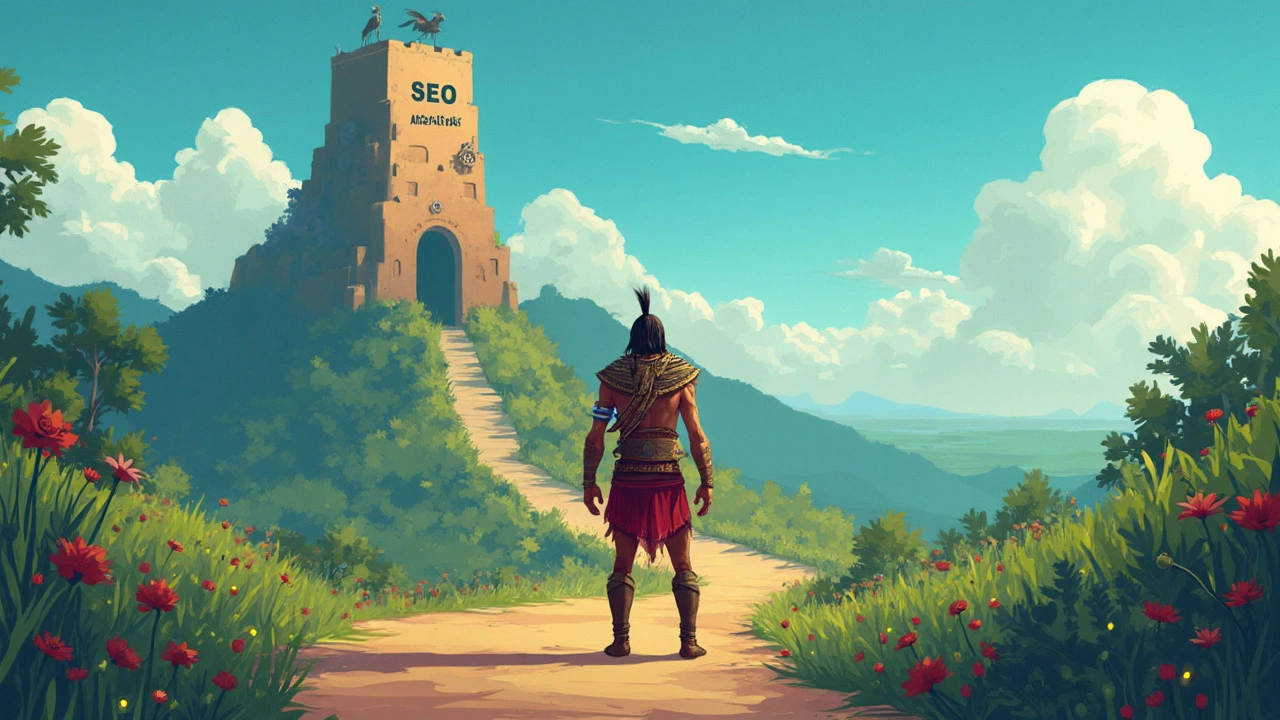SEO is often hailed as the holy grail of online visibility, but have you ever wondered if there are times when it's better to skip it? Yep, you heard it right! There are instances where opting out of SEO might be the smarter move, especially for web developers. Whether you're working on a project where functionality is key or where user experience takes center stage, it's crucial to know when to put SEO on the back burner.
Take a moment and think about those niche websites—sometimes, ranking isn't everything. It's about delivering unique value to a specific audience. Imagine you're developing an internal corporate tool—SEO is the last thing you want to worry about there. Stretching to fit SEO in projects like these might just mean barking up the wrong tree.
- Understanding SEO Boundaries
- When Functionality Trumps SEO
- User Experience Over Search Visibility
- The Cost of SEO: Return on Investment
- SEO in Niche or Private Sites
Understanding SEO Boundaries
SEO is an incredibly useful tool, but it has its limits. There are times when putting it first might not serve the best interests of your project. Sometimes it feels like SEO is there to fit a square peg in a round hole, right?
One key thing to remember is that SEO is not a one-size-fits-all solution. You have to understand when SEO should take the backseat to other project goals, especially in web development. Suddenly cramming SEO tactics might just lead to compromise more important aspects.
Technical Constraints
Web developers know code is king. Think about projects with tight technical constraints or special setups where shoehorning SEO practices could mess everything up. Custom software or systems with unique backend setups might not be able to support extensive SEO without breaking functionality.
Content Appropriateness
Then there's the content itself. Ask yourself: Will focusing on SEO mean diluting the authentic message of the site? If it's a blog or a creative expression platform, the content could lose its genuine voice.
Time & Resources
Don't overlook resources. If you're knee-deep in tight deadlines or juggling multiple priorities, diving into SEO might just spread your team too thin. Focus on getting the core aspects right instead.
- Identify your project's primary goals.
- Analyze technical abilities and limitations.
- Consider the voice of your content.
- Assess your resources and time constraints.
- Decide if SEO actions align or misalign with these points.
Recognizing these boundaries saves time and ensures more coherent and functional projects that meet their intended goals without unnecessary SEO tinkering.
When Functionality Trumps SEO
When you're grinding away developing a website, it's easy to get swept up in the excitement of boosting rankings using SEO. However, there are times when focusing too hard on SEO can actually hinder your site's performance. The main goal in these instances should be ensuring the website functions flawlessly.
Consider this: what good are search rankings if your site doesn't work well for the users who find it? Let’s dive into a few scenarios where functionality should take the priority:
Interactive Applications
For sites primarily running interactive applications, UX is king. Think of platforms like those used for online learning or real-time collaboration tools. These sites need to be fast, smooth, and user-friendly. Bloated SEO scripts can slow things down, making them a nightmare for users.
Data-Driven Tools
Consider web tools that handle sensitive data like financial calculators or health trackers. Here, the emphasis should be on security and precision rather than being optimized for search engines. A streamlined codebase without the extra baggage of excessive SEO components will likely result in a faster and more secure experience.
Page Load Speed
Google does consider page speed as a ranking factor, but stuffing your pages with SEO-heavy elements can slow it down—which is quite the opposite of helpful. Simple, clean, fast-loading pages often earn a better reputation among users and indirectly lead to longer-lasting site success.
Let's look at some stats: here's a quick reminder on how loading speed impacts user engagement:
| Page Load Time | Bounce Rate |
|---|---|
| 1-3 seconds | 32% |
| 3-5 seconds | 90% |
| 5+ seconds | 123% |
Prioritize a snappy, functional website that keeps your visitors happy rather than getting tangled in the web of SEO overload. At the end of the day, user satisfaction usually translates into better organic growth, even if it requires taking a step back from aggressive SEO strategies.

User Experience Over Search Visibility
Alright, let's dive into one of the most common dilemmas developers face: should you prioritize user experience or search visibility? It's a tough call, but here's the thing - a slick site that's easy to navigate often wins over a highly optimized SEO site that's clunky to use. After all, what's the point of showing up in search results if visitors drop off because the site is a pain to use, right?
Take, for example, page speed. Nobody likes waiting for pages to load. A whopping 53% of mobile site visits are abandoned if pages take longer than three seconds to load. Now, if your SEO strategies involve heavy images or endless plugins, it can slow the site down. Sometimes, sacrificing a bit of search rank to ensure fast loading pages makes total sense.
Prioritizing Content Readability
Let's talk readability. Imagine visiting a site and being greeted by blocks of text that require a magnifying glass. Not cool. Prioritizing readability over stuffing keywords impacts both SEO and user experience positively. A good rule of thumb is focusing on clear and engaging content that users actually want to read, even if it means skipping some SEO tactics.
Navigation is Key
How's your site's navigation? Easy to get around or more like a labyrinth? A simple, intuitive navigation menu is a user experience win. Complex, keyword-heavy menus can confuse visitors, but streamlining with clear labels and paths can make all the difference. If SEO optimizations complicate things, take a step back.
Design Considerations
Flashy designs might catch the eye, but they can also bog down performance. Balancing aesthetics with functionality sometimes means scaling back on heavy-duty designs in favor of simplicity. This approach not only speeds things up but enhances user interaction.
- Keep things simple and clear.
- Minimize the clutter.
- Let users find what they're looking for effortlessly.
Ultimately, don't let SEO overshadow the human element of web design. An awesome user experience not only retains visitors but can also encourage them to share your site, bringing in organic traffic beyond just search engines.
The Cost of SEO: Return on Investment
Alright, let’s talk about the money side of things. SEO is awesome for boosting those site rankings, but it's not always rainbows and butterflies. There’s a cost involved, and it's not just financial. You could invest tons of time and energy only to see little in return. So, how do you know if SEO is worth it?
First off, let's consider the actual expenses. Apart from hiring an SEO expert or agency, think about the tools and resources you might need—keyword research tools, analytics software, the works. These aren’t always cheap!
SEO is a long game, not a quick fix. It often takes months to see gains. So, if you’ve got a project with a tight timeline, pouring those resources into SEO might not be worth it.
Understanding ROI in SEO
So, when does SEO pay off? Usually when you’ve got a commercial site with tons of competition where search visibility could make or break your sales. Here measuring ROI can be powerful. Tools like Google Analytics can show you how much extra revenue those higher rankings are pulling in.
Yet, if your website doesn’t sell directly or relies heavily on word-of-mouth, maybe, just maybe, SEO isn’t your knight in shining armor. Analyze the nature of your site first.
Weighing the Costs
Make a list of potential costs versus your expected benefits. Think about hiring and tools, then measure this against what you hope to gain. Is doubling your traffic worth the thousands in expenses, or could those resources be better spent elsewhere?
| Potential SEO Costs | Considerations |
|---|---|
| Professional Services | Can be expensive, especially ongoing. |
| Time Investment | Long-term commitment needed for results. |
So, should you skip it? If the money spent doesn't bring more value than boosting other areas like development or design, maybe SEO should sit this one out. Weigh your options—knowing when to hold back can keep your project sharp and focused!

SEO in Niche or Private Sites
When it comes to SEO, the first thought is usually about getting tons of traffic. But does that apply to niche or private sites? Not always. These sites often serve a very specific audience, and sometimes, the effort to optimize for search engines becomes more of a hassle than it's worth.
Why is that so? Well, let's say you've got a website catering to a small group of enthusiasts or a private community—think forums or membership sites. Here, the community feel and personal engagement matter way more than a broad reach. For instance, a site dedicated to rare antique tractor collectors isn't likely vying for mainstream visibility as much as it is for creating value within its niche circle.
Focus on Community Over Traffic
The intention with niche sites is often about deep engagement rather than wide reach. These sites thrive on content that's valuable to a select few rather than to everyone. Instead of chasing web development based SEO practices, pumping out relevant content and facilitating meaningful interactions can be the priority.
Consider an internal corporate site—a perfect example of when SEO takes a backseat. Such platforms often don't need to rank on search engines as they're meant for internal users. The goal is to optimize for user convenience and accessibility rather than for external search results.
Resources and ROI
Another thing to think about is the cost vs. benefit. If you're pouring time and money into SEO for a niche site and only seeing marginal benefits, it might be time to reallocate those resources. Prioritize what's adding real value—be it through community growth, more meaningful engagement, or better user satisfaction.
In short, while SEO is important, knowing when to ease up can save you effort and align better with your site's core purpose. After all, there's no one-size-fits-all strategy in the digital world.



